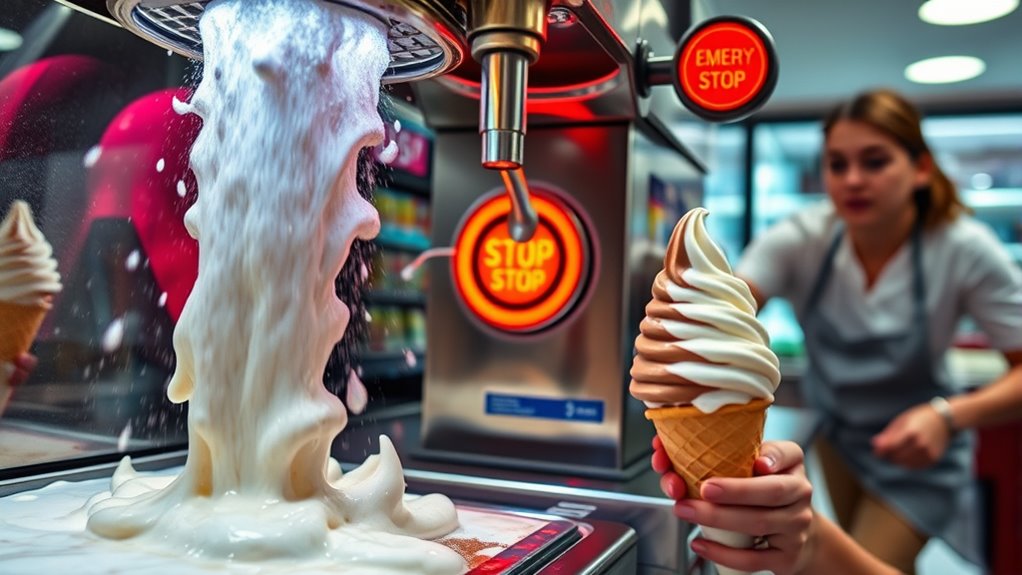If your ice cream machine suddenly stops, stay calm and check the power supply first—make sure it’s plugged in and the outlet works. Look for warning lights or error messages on the control panel, and try resetting the machine by turning it off then on again. Clear any ice buildup or debris blocking the system, and ensure all parts are properly assembled. If issues persist, there’s more you can do to troubleshoot — keep going to learn how.
Key Takeaways
- Stay calm and assess the situation quickly to prevent further damage.
- Check power supply, outlets, and control panel for error messages or warning lights.
- Reset the machine by turning it off, waiting a few moments, then restarting.
- Clear ice buildup and debris from refrigeration components for proper cooling.
- Contact a professional technician if troubleshooting doesn’t resolve the issue.

An ice cream machine breaking down unexpectedly can quickly turn a busy day into a stressful situation. When the machine suddenly stops working or malfunctions, it’s vital to act swiftly to minimize downtime and prevent further damage. The first step is to stay calm and assess the situation. Often, a quick troubleshooting step can resolve minor issues without needing professional repair.
Start by checking the power supply. Confirm the machine is plugged in properly and that the outlet is functioning. Sometimes, simple electrical issues cause the machine to halt. If the power source is fine, look for warning lights or error messages on the control panel. Many machines display codes that can give you clues about what’s wrong. Keep your user manual handy, as it often contains specific troubleshooting steps for these codes. If you don’t have the manual, many manufacturers offer digital copies online.
Check the power connection and look for error codes on the control panel.
Next, perform some basic maintenance tips to keep your machine in top shape. Regular cleaning and lubrication are essential, especially after long periods of use. Make sure the refrigeration system isn’t blocked by ice buildup or debris. Check the condenser coils—dust and dirt can impair cooling efficiency. Clean these components carefully using a soft brush or a vacuum, following the manufacturer’s guidelines. Also, verify that all parts are securely assembled, including the blades, augers, and lids. Loose or misaligned parts can cause operational issues or noise.
If the machine still isn’t running smoothly, consider the common troubleshooting steps. For instance, if it’s not freezing properly, the compressor might be underperforming or there could be a refrigerant leak. Listen for unusual noises or vibrations, which can hint at mechanical issues. Sometimes, resetting the machine by turning it off, waiting a few minutes, then turning it back on can clear electronic glitches. For machines with digital controls, resetting can resolve minor software bugs. Additionally, ensuring that your heat pump’s refrigerants are properly managed and not leaking can prevent cooling issues in related equipment. Regularly inspecting and maintaining components such as valves and sensors can help prevent future breakdowns. Maintaining proper system pressure and temperature levels is also critical for optimal operation. Staying informed about automated systems and how they function can help you troubleshoot more effectively.
If none of these troubleshooting steps fix the problem, it’s time to contact a professional technician. Delaying repairs might lead to more extensive damage or longer downtime. While waiting, ensure that the machine is clean and dry, and keep a record of any error messages or unusual sounds to assist the technician. Remember, routine maintenance and prompt troubleshooting are your best defenses against sudden breakdowns. Staying proactive with regular checks can prevent many issues before they escalate, guaranteeing your ice cream machine stays operational during your busiest days.
Frequently Asked Questions
Can I Fix the Ice Cream Machine Myself?
You might be able to handle DIY repairs on your ice cream machine if you’re comfortable with equipment maintenance. Start by troubleshooting common issues like clogging or temperature problems, but always follow safety precautions. However, avoid complex repairs that require specialized tools or knowledge, as improper fixes can worsen the situation. When in doubt, it’s best to call a professional technician to guarantee proper maintenance and avoid damaging your equipment further.
How Do I Identify a Serious Mechanical Problem?
You notice your machine malfunctions or the cooling system isn’t working properly—this signals a serious mechanical problem. Look for unusual noises, leaks, or overheating, which are clear signs of trouble. If the machine isn’t maintaining proper temperature or making strange sounds, don’t ignore these issues. These signs indicate a problem beyond simple fixes, and you should act quickly to prevent further damage or costly repairs.
What Safety Precautions Should I Take During an Emergency?
During an emergency, you should prioritize your safety by following proper hygiene practices and emergency preparedness. Always wear protective gear if available, and keep the area clean to prevent contamination. Stay calm, assess the situation quickly, and follow established safety protocols. Keep emergency contact numbers handy, and make sure everyone nearby knows what to do. By staying prepared and practicing good hygiene, you reduce risks and handle the situation more effectively.
Is It Safe to Use Alternative Cooling Methods Temporarily?
In an emergency, using cooling alternatives temporarily can be safe if you prioritize emergency preparedness. You might use ice packs, chilled towels, or cold water to maintain proper temperatures. Just guarantee these methods are used carefully, avoiding direct contact with skin or food, and monitor the situation closely. Always have a plan for quick cooling solutions ready beforehand, so you’re prepared to act swiftly and safely in any urgent situation.
When Should I Call a Professional Technician?
When should you call a professional technician? Think of your ice cream machine as a delicate dancer; if it stumbles despite following cleaning tips and sticking to maintenance schedules, it’s time to call in an expert. If troubleshooting doesn’t resolve issues like inconsistent freezing or strange noises, professional help guarantees safety and longevity. Don’t wait for a complete breakdown—timely intervention keeps your machine running smoothly and your business thriving.
Conclusion
So, next time your ice cream machine acts up, remember that quick action can be your saving grace. Imagine catching a sudden rainstorm just as you’re about to enjoy a scoop—timely maneuvering clears the clouds and brings back the sunshine. Similarly, responding promptly to the emergency can turn a messy situation into a smooth fix. Stay calm, act fast, and soon you’ll be savoring your favorite treat again, no matter the unexpected hiccup.









